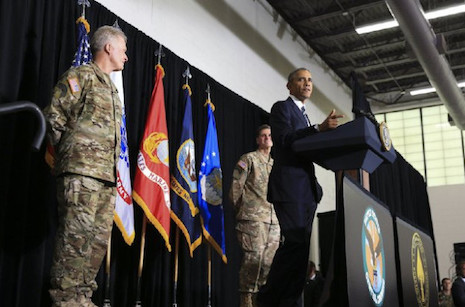Seventy-five years ago, Congress declared war on Japan. U.S. declarations of war against Germany and Italy followed four days later, and Congress hasn’t declared war since. Korea, Vietnam, the Persian Gulf, Iraq, Afghanistan, Libya, Granada, Kosovo, Bosnia, Yemen, Lebanon, Panama, Somalia — America fought its wars in all these places without an official declaration. Usually Congress passed some sort of authorization, but often, most recently in Libya, even that step was skipped. The executive has steadily seized war powers from the legislative branch, where the Constitution places it. And the legislative branch has been happy to abdicate its responsibility. President Obama, in his final anti-terrorism speech in office, called on Congress Tuesday to reclaim its duty. “If a threat is serious enough to require the sacrifice of our men and women in uniform,” he told the assembled soldiers and airmen at MacDill Air Force base, “then members of Congress should at least have the courage to make clear where they stand, not on the sidelines, not on cable TV shows but by fulfilling their constitutional duty and authorizing the use of force against the threats that we face today. That’s how democracies are supposed to work.” Obama is right. The executive is supposed to execute our foreign policy, including our wars. Congress, more accountable to the people, is supposed to set our foreign policy and declare our wars. Obama on Wednesday was scolding Congress for not debating or voting on a new authorization of the use of military force for our newest fight: the effort to demolish the Islamic State. The president is fighting the Islamic State in Libya and Syria on the basis of the 2001 authorization Congress passed just after the Sept. 11, 2001 terrorist attacks, that President Bush used to unseat the Taliban in Afghanistan. To make this war legal, White House lawyers have had to argue that in authorizing strikes against those behind 9/11 attacks, Congress 15 years ago authorized attacks today on the Islamic State, because it is a spinoff of al Qaeda. It’s a stretch, and Obama is right to be uncomfortable with it. He is also right that Congress should debate, craft and pass a new authorization, naming the Islamic State as the enemy and setting clear goals. Obama’s war against the Islamic State underscores that absent congressionally authorized war we don’t get peace, we get permanent war. Permanent war can cripple for a liberal democracy. “We’re at war” is a handy excuse for all sorts of government misbehavior, such as overspending, domestic spying, abuse of civil liberties, limits on transparency and accountability. Indeed, the 2001 authorization has been used to justify NSA snooping on Americans. It’s too bad our constitutional-law professor of a president destroyed his own credibility on the issue when he waged a months-long war in Libya in 2011 to depose Moammar Gadhafi. He didn’t ask Congress for authority to intervene in Libya’s civil war. His legal arguments at the time were transparently false. It was another blow to the idea that Congress, rather than the president, sends our armed forces to war. But just because Obama did not practice what he now preaches, does not mean his words should be ignored today. Returning war power to Congress does not prevent a president from acting if the country is attacked. He has a duty to repel an attack, and may retaliate for a brief period until Congress can vote. The Constitution gives Congress alone the power to declare war and to organize the armed forces. As Obama pointed out at MacDill, this separation of powers provides for a real debate. We had a debate on Iraq. Even if you think the wrong side won it, the debate was good for the country. A congressional debate and vote also provides more Democratic accountability than unilateral presidential action does. It may seem a bit rich for a president, on his way out of office, to demand we shift war powers away from the executive and towards Congress, especially given Libya. But Obama’s illegal war in Libya doesn’t undermine the truth of his argument, it reinforces it. Hypocrisy is often a case of someone doing the wrong thing and saying the right thing. President-elect Trump and the GOP Congress ought to do as Obama says, not as he did. Source URL |
